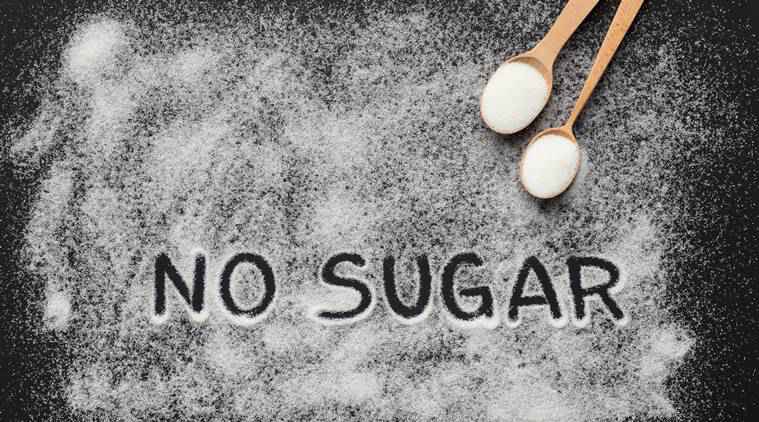- India
- International
From chocolates to yogurt: Does ‘sugar-free’ mean ‘no sugar’
Sugar is a simple carbohydrate that the body converts into glucose and uses for energy. But the effect on the body and your overall health depends on the type of sugar you are consuming.
 Since added sugars are easily broken down by one’s body, sugar levels tend to rise very rapidly. (Source: Getty Images/Thinkstock)
Since added sugars are easily broken down by one’s body, sugar levels tend to rise very rapidly. (Source: Getty Images/Thinkstock)
While most of us happily consume anything that says “sugar-free”, assuming that it doesn’t have sugar at all, what we don’t realise is that “sugar-free” doesn’t mean ‘no sugar’. Like we add white table sugar or brown sugar to our cakes, coffee, cookies and even fruits, food manufacturers are also known to add artificial sweeteners, a form of sugar, or typically high-fructose corn syrup to foods and beverages including crackers, tomato sauce and salad dressing. Even low-fat foods like flavoured yogurt are considered to be high on sugar.
Pune-based diabetes researcher Dr Pramod Tripathi, founder, Freedom from Diabetes center, tells indianexpress.com, “Sugar-free and no added sugar labelled products do not mean the same thing”. “According to United States’ Food and Drug Administration guidelines ‘no added sugar’ means no sugar-containing ingredient is used during processing and ‘sugar free’ means a food must have 0.5 gram of sugar (naturally occurring or any sugar ingredient) per serving. Both these terms do not say anything about artificial sweeteners.”
Either added by consumers themselves or found in processed foods, such sugars are called free sugars, and include glucose, dextrose, fructose, household sugar (sucrose), malt sugar (maltose) and also sugars that are found in honey, syrups, fruit juices and fruit juice concentrates.
ALSO READ: Diabetes: What you should eat to keep your blood sugar level in control
Why is added sugar a concern? Sugar in all forms is a simple carbohydrate that the body converts into glucose and uses for energy. But the effect on the body and your overall health depends on the type of sugar you are eating. Since added sugars are easily broken down by once’s body, sugar levels tend to rise very rapidly unlike natural sugars.

Aside from adding calories to your body, added sugar provides no nutrition which is why it is often referred to as ’empty calories’ that causes weight gain and obesity. Having too much sugar can lead to many problems, ranging from trouble in concentration, mood swings, sudden drop and rise in blood sugar level, inflammation in the body to chronic illnesses like heart problems and diabetes.
According to FDA, the added sugar-intake recommendation should not be more than 10 per cent of one’s daily calorie intake. But World Health Organisation (WHO) reduced this percentage from 10 to five per cent. For an adult who has a normal BMI, WHO recommends no more than five teaspoons of sugar.
But the guideline does not refer to naturally occurring sugar that is found in fresh fruits, vegetables, milk and whole grains as these food items are known to have less amount of sugar and also have other additional health benefits. Even doctors are concerned about added sugars and not the naturally occurring sugar.
In fact, accumulating evidence also suggests that frequent consumers of these sugar substitutes may also be at increased risk of excessive weight gain, metabolic syndrome, type 2 diabetes, and cardiovascular disease as per a Purdue University study in the US.
Since the generally accepted definition of sugar includes just glucose and sucrose, these sugar-free products are laden with FDA-approved artificial sweeteners, suggests Dr Mayank Uppal, Consultant, Internal Medicine, Sitaram Bhartia Institute of Science & Research, Delhi.
“Neotame, Saccharin, Aspartame, Acesulfame Potassium, Sucralose and Advantame are some of the artificial sweeteners. When people end up using these products, it not only adds to their calories but makes the product very sweet due to the use of high-intensity artificial sweeteners. As consumers gorge on these products, they tend to develop a distaste for healthier options like fruits that are mildly sweet. This makes them add a large amount of calories to their diet,” he tells indianexpress.com.
So what is the way out? Dr Uppal recommends that while looking for sugar-free products, consumers should also be aware that products that claim to be sugar-free may not necessarily be low in calories and carbohydrates as perceived. “Consumers should not be satisfied with the conventional definition of sugar but also stay away from products that may contain ingredients like corn syrup extract, maple syrup and honey,” he says.
“Read the ingredients list to identify what kinds of sweeteners are contained in a food,” advises Dr Tripathi. Keeping in view the growing obesity and diabetes concerns, according to nutritionist Purvi Bansal from HealthyRoots, Chandigarh, it’s best to avoid artificially sweetened products and consume sugar-containing foods in their natural form such as whole fruits which are highly nutritious, high in fibre and have a low glycemic load.
May 07: Latest News
- 01
- 02
- 03
- 04
- 05



































